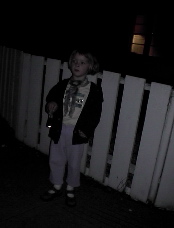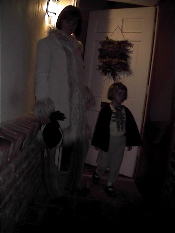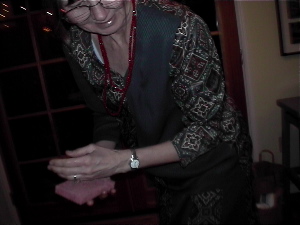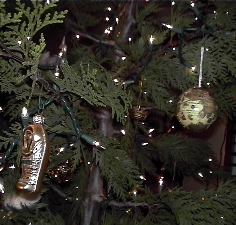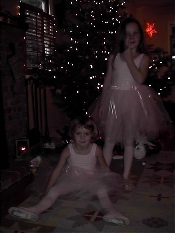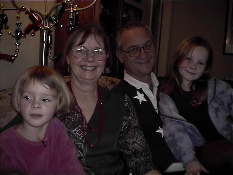Towards a Unified Theory of Christmas
Santa Rosa, Calif.
Dec. 24, 2002
For some time now I've been working towards a unified theory of Christmas, something that could not only make me feel really good about the synthesis of all the new and old traditions that blend together to make up modern Christmas, but even make me feel comfortable explaining it to my children (and anyone else who seems, in the words of Cindy Lou Who, "kerbobbled" by the whole experience).
As I mentioned to Em the other night, there are at least two threads of old traditions that have blended to bake up the trappings of our modern Christmas: a pagan winter celebration of lights (where we get the Christmas tree, the Yule log, the feasting, the lights, and lot of strange carols) and the Christan tradition, celebrating the (otherwise undated) birth of Jesus (from where we get the nativity, the wisemen, the star, the angels, the gift-giving, and of course, the name).
But now there is at least a third Christmas, the one that -- unless you're a Druid or a devout Christian -- you probably spend the most time and emotional investment on: a worldwide celebration of shopping and gift giving. It certainly rose out of the other two, but what's wrong with acknowledging that it has taken on a life of it own? We thrive on it. As much as we grumble about crowds and the retail industry spends one-third of its year selling Christmas, and the related revenues make up half its annual income.
So, given that this third Christmas supports our economy, and it's where we spend a great deal of our time and emotion, why do we denigrate it? How often do we pretend to be disgusted by the "crass commercialization" of Christmas while thumbing through the Sunday circulars? We bemoan the crowds at malls, but worry for the future of a shopping center where they are thin. We decry the need to spend hundreds of dollars on childrens' toys, but cheer the consumer confidence that keeps our economy from double-dipping.
I think we enjoy this one the most; so why do we feel so guilty about it? I was prompted to wonder about this when I saw in Bangkok earlier this month large neon displays that unashamedly wished us a "Merry Xmas!" There was no ill-will in excising the Christ from the name, since for Buddhists, Jesus Christ doesn't play too large a role in their holiday. It was an honest acknowledgment that the modern holiday is about trees and lights, wrapped gifts and stuffed stockings. As a Christian, the holiday for me has to include meaning about the birth of Jesus, the promise he brings to the world, the story of his life. But it doesn't have to mean that to everyone, including the Thais.
Beyond the economic need for Christmas, it seems to satisfy another deeper psychological need. For the medieval pagans, the darkness and cold were true enemies. The yule celebration offered some hope that the worst was over, and they were on their way back towards balmy summer evenings with their long twilights. Darkness and cold aren't nearly so daunting in our electrified, central-heating world. A more serious enemy is the frenetic pace of daily life, and the endless errands and obligations. At Christmastime, these build to a worrying peak -- just as the cold and dark did for our ancestors. But by Christmas Eve, the worst is over. What hasn't been bought, won't be. We can let go and relax, like our ancient forebears did, knowing that calmer times lie ahead. For us, as it was for them, it's a season of renewal and hope. At least until the white sales of January.

